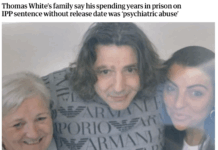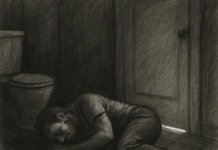The Cat Is Out of the Bag
I’ve healed; not overnight and not without effort, but today I feel the vitality that I had before my psychiatrization began as a teen.
A Mad Perspective on IFS Training
I became concerned that the reason I was unable to hear from my parts was because I take antipsychotic medication.
Protecting the False Narrative About Antidepressants
We have a mental health crisis because the existing depression drug-focused approaches are not working.
ChatGPT Weakens Your Ability to Think, MIT Study Finds
“This cognitive offloading phenomenon raises concerns about the long-term implications for human intellectual development and autonomy,” the researchers write.
Goodbye, Brian Wilson
I propose to call any psychiatrist-patient bond “Landy syndrome” after psychiatrist Eugene Landy, the captor, abuser and oppressor of Brian Wilson.
Madness Is a Human Phenomenon
We can see how complicated it is to be human and how much human suffering (called psychopathology) is a complex and unique human phenomena.
Why Psychotherapy Should Busy Itself with Building Character Strengths, Not Reducing Symptoms
Clients want outcomes like self-understanding, self-agency, and social engagement from therapy.
It’s a No-Brainer: Living Proof We Are More Than Our Parts
Terms like “reward systems,” “emotion centers,” and “decision circuits” suggest precision. But these aren’t discoveries—they’re metaphors.
People Are Being Involuntarily Committed After Spiraling Into “ChatGPT Psychosis”
From Futurism: "Many ChatGPT users are developing all-consuming obsessions with the chatbot, spiraling into severe mental health crises characterized by paranoia, delusions, and breaks...
People Say They’ve Faced Withdrawals from SSRIs. They Want Recognition and Research
A mere 13 years after being written about by Mad in America and others, NPR realises that SSRI antidepressants might be difficult to get...
Soteria—A Human Response to a Human Problem
The Soteria model has gained recognition in Israel, with more than 35 such "stabilizing houses" now operating, most publicly funded.
Conceptual Synaesthesia as Cognitive Literacy
I don’t just feel things; I translate them. For those of us who experience it, it is not a novelty. It is a structure for thinking.
Why Psychosis Is Not So Crazy: A Conversation with Stijn Vanheule
Vanheule urges clinicians to listen for the structure in psychotic thought. He offers clinical examples that reframe hallucinations as a form of creative response to unspeakable dilemmas.
From Wounds to Labels to “Mental Illness”
We don’t need to understand someone’s entire past to exercise a little emotional humility—to see behavior as adaptation, not brokenness.
Man Developed Psychosis After Being Jailed for 13 years on Indefinite Sentence
From The Guardian: "A prisoner driven to psychosis after being jailed for more than a decade under an indeterminate sentence has finally been moved...
Waking Up to Your Emotions 101: The Other Side of Psychiatric Drug Withdrawal
Many people find themselves stuck: withdrawal symptoms might have passed, but emotionally, life feels overwhelming.
Antipsychotics Do Not Provide a Clinically Meaningful Benefit Over the Short-Term: A Review of...
70 years of RCTs fail to provide evidence that antipsychotics provide a clinically meaningful benefit for treating acute psychotic episodes.
MIA Writer Peter Sterling’s Memoir of Global Engagement
In a publication titled Memoirs of Global Engagement, MIA writer Peter Sterling tells of his path to a life of "global engagement."
Beyond Medicalization: Psychedelic Therapy and the Promise of Community-Based Healing
Will psychedelics represent something different, or will we recreate the same problematic paradigms?
Where Is God When I Cut Myself? Soul Care and the Voices of Self-Injury...
Care, as I’ve come to see it, is about sitting beside someone when the pain is too loud for words and not leaving.
The Pill That Stays After the Panic Ends
We need to stop expecting pills to do the work that only truth, connection, and expression can do. Relief is not the same as recovery.
Therapists, Neutrality Is No Longer an Option — Politics Is Tearing Us Apart
To my fellow therapists: stop playing neutral. Stop minimizing systemic trauma to keep your comfort intact.
Veterans Take Their “War Cry For Change” to Capitol Hill
Despite VHA’s $571 million suicide prevention budget, veterans are dying by suicide at alarmingly high rates. Advocates want answers and accountability.
Senators Propose Ban on Drug Advertising to Consumers
From The Wall Street Journal: "Sens. Bernie Sanders (I., Vt.) and Angus King (I., Maine) introduced a bill Thursday that would ban pharmaceutical manufacturers...
Inertia as Neuroceptive State Beyond the Pathologizing Lens
Reframing inertia as an adaptive, biologically based survival response offers a powerful alternative to traditional deficit-oriented models.































